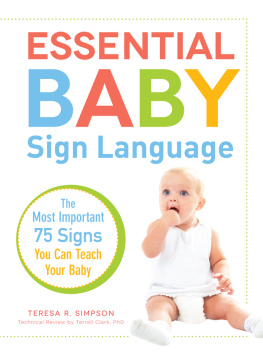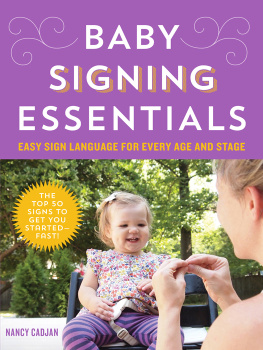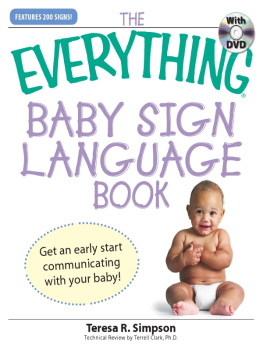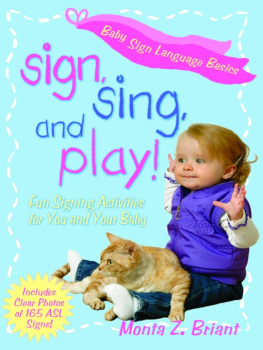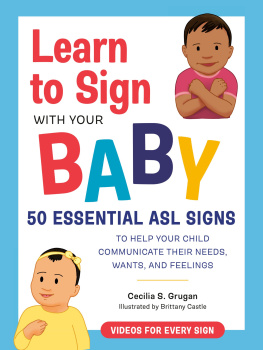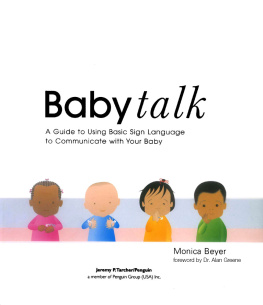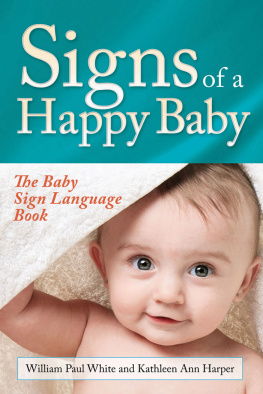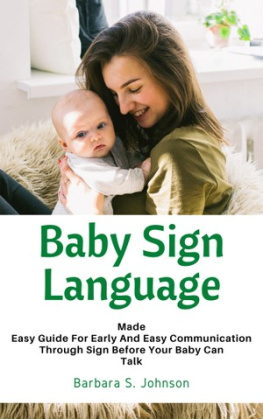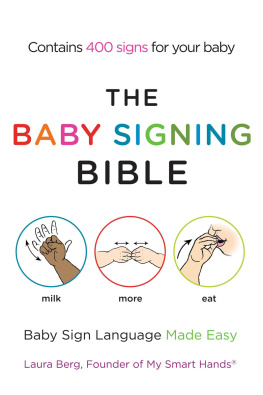There is something magical about signing with your baby. It gives you a glimpse into the workings of his little mind and provides extra insight into his personality. It is nothing short of amazing.
Today, parents by the thousands are discovering the immense benefits of signing with their babies, and they are learning that a signing baby is a happy baby. Signing is a beautiful way to communicate with your child. It is fun and educational, and it is an excellent way to spend quality time together.
CHAPTER 1
Why Start Signing?
Babies communicate in a variety of ways from the moment they are born. The youngest of babies will connect with his parents both by crying and by making eye contact. This most primitive of exchanges enables a baby to express his needs or displeasure and also allows him to bond with his parents.
As a baby gets older, his methods of communication become more sophisticated. He graduates to using coos and smiles to express his contentment, and his cries become distinctive to his needs. At this time, he is probably discovering the many amazing things he can do with his hands, one of which can be to learn how to sign.
The benefits of signing with your baby are numerous. In addition to the developmental advantages it brings, parents and caregivers love being able to interact with their children. In this chapter, find out why sign language is the new language being spoken in playgroups, parks, and day-care centers across the country and how easy it is for you and your child to acquire.
The Benefits of Baby Sign Language
As the parent or caregiver of a baby, you have undoubtedly spent a great deal of time in one-sided conversation. With minimal response from your little one, it can be difficult to know how much, if any, of the conversation she comprehends. On the flip side of that conundrum, it is likely that your baby has also engaged in some one-sided conversations of her own. She may coo, babble, or use baby jargon. She may be trying to express her needs or just chatting about the world around her.
Although you and your baby wont engage in fluent sign-language conversations, you will find that the level of communication sign language provides will change your life in a positive and noticeable way. The use of sign opens up a whole new expressive world for the two of you and gives you the ability to engage in far more meaningful conversation than you are otherwise able to have.
Less Frustration for Baby
As babies become more expressive, they also become more frustrated when they are unable to convey their thoughts, wants, or needs. They are doing all they can to be clear, yet they cant seem to get anyone to understand them. This communication gap can lead to temper tantrums, crying jags, and a feeling of dissatisfaction. As your baby begins to acquire these essential signs, she will discover that signing can get a response from you that crying and talking doesnt always bring. This will result in a happier baby who derives a great deal of satisfaction from being understood.
Less Frustration for You
It goes without saying that a happier baby results in a happier parent. As babys frustration is diminished due to her newfound ability to communicate, you will find that her improved mood will greatly improve yours, as well. But the benefits dont end there. In the same way that baby gets frustrated when she cant get her point across to you, you likely feel a certain amount of frustration when you are unable to convey your message to her. As your baby begins to understand your signs, you will begin to see the communication gap narrowing. Of course, a baby understands your spoken words long before she begins to speak, but when you are able to use signs that she herself is able to use, you will know with certainty that she comprehends what you are saying to her.
Improved Self-Expression
Another important benefit of baby sign language is that signing babies are better able to express themselves in all sorts of ways. That is, they are able to convey their thoughts and feelings in a way that nonsigning babies cannot. This ability may result in babies who are more confident and outspoken. They may come to understand the validity of their feelings earlier and understand that it is acceptable to express them.
Instant Camaraderie
A special bond will form between you and your baby when you practice sign together. Think of it as a special language between you and your baby. It is amazing to be able to communicate with your child. With this shared language the two of you are likely to build a deeper friendship that can last a lifetime.
When your baby first begins to sign, she will likely try out her signing skills with everyone around her, and she may grow frustrated when she discovers that not everyone responds to her signs. She will soon figure out who can understand her and who cant. Those who can will enjoy sharing this special language with your child.
Dispelling Common Myths
As with anything else in life that is misunderstood, a few myths seem to rear their ugly heads over and over in regard to baby sign language. As a signing parent, it is important that you believe in what you are doing. This will help to keep you and your child motivated. If you find that you are having doubts about the validity or effectiveness of baby sign language, talk to other signing parents and listen to their insight and experiences.
Myth: Slower to Talk
The idea that babies who sign are slower to talk than their nonsigning peers is one that comes from the misunderstanding that sign language actually replaces the spoken word. For babies who are able to hear, that just is not true. In fact, babies who practice sign language are often quicker to talk than their nonsigning peers. Why? Because part of using signs with babies involves saying each word out loud as you are signing. For this reason, many signing babies will learn a new spoken word and its sign at the same time.
Myth: Pushed Too Hard
Many people who are uneducated about baby sign language feel that these babies are being pushed too hard to learn a skill that is outside of their natural ability. These naysayers liken baby sign language to things like trying to teach a baby how to play concert piano or do long division.
Essential Tip
Although a parent who signs with her baby is not necessarily trying to create a super-baby, it is possible to subject her to undue amounts of pressure. This is true for any skill a baby is learning, such as walking, talking, or potty training. Remember to be patient with your child and let her learn at her own pace.

